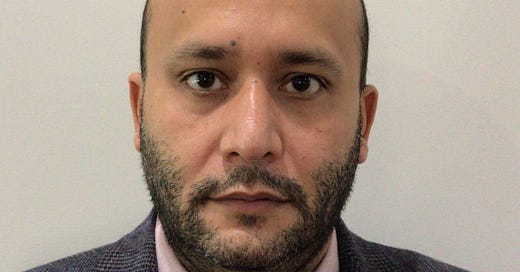“Spoken word poetry gives a traumatic experience humanity. People can look beyond the fact that there’s a massive war going on, but actually see the person.”
- Amerah Saleh, Yemeni poet
For more than six years, Yemen – already the poorest country in the Middle East – has been ravaged by a war between the Saudi-backed coalition and dislodged Yemen government and the Iran-supported Houthi insurgency that continues to control the capital, Sana'a.
The United Nations has referred to Yemen as the worst humanitarian crisis globally, leaving more than 80 percent of the 29 million people dependent on aid to survive. Millions have been displaced and thousands killed. The crippled economy has sent food prices soaring, making even the staples inaccessible to most.
And yet, the bloodletting continues with much confusion when – or if – it will ever stop.
We chat with Minister Wael Al Hamdani, the Deputy Chief of Mission at the Embassy of Yemen to the United States, a diplomat who asserts that internal corruption and apathy from a distracted international community stand in the way of saving Yemeni who are dying in droves by the day.
Tell me a little about your background and how you came to the US as a diplomat.
I've been working in the Foreign Service for 15 years, and I've been covering the US and counterterrorism for around five years. I've worked very closely with all American diplomats and ambassadors assigned to Yemen. I'm a third generation of diplomats who have worked in the Foreign Service, and my great uncle was doing the same job I'm doing right now, Deputy Chief of Mission in DC 60 years ago.
My father was also an ambassador and is a professor at Sana'a University. We have all believed in a very strong Yemeni-American relationship; we need this to put Yemen on the path to the future of an emerging democracy.
The war has been going for more than six years now. The UN reports more than 16 million are suffering severe food shortages and acute hunger. It is on the brink of being declared a famine. So what needs to happen – and fast?
Many American people don't know Yemen and yet have been sending millions of dollars every year to Yemen, and we don't want this to fall into the wrong hands. So there are a lot of good NGOs that are American and Yemeni Americans that are helping. But if you don't fix the political problem and the political structure of the our government is not going to help.
As a Yemeni, we want to be part of the New World – the free world that the US leads. We are done with being this renegade state at the lower bottom of the Arabian Peninsula. We have been trying the military solution. And a military can be a solution can be part of the whole holistic approach. We have to tell everybody that we cannot defeat others, you have to coexist with others. You have to sit by the table and negotiate.
On the campaign trail and in his first few weeks in office, President Joe Biden made ending the stalemated conflict a centerpiece of his foreign policy agenda. His stance centered on backing the UN-led peace talks and pressing Riyadh to sever its military involvement. Biden also reversed the Trump administration's designation of the Houthis, also called Ansar Allah, as a foreign terrorist group and appointed Tim Lenderking, an experienced diplomat, as special envoy to the UN negotiations. Biden has promised to expand US diplomacy in the region.
Yet, Yemen still seems stuck without resolution in sight. Instead, the crisis continues to deepen. In June, the Houthis rebuffed a US ceasefire proposition and declined to meet with the UN envoy in Muscat, Oman.
With a new administration comes new momentum, and we have to benefit from this momentum.
I think that the UN can bring the solution. But this only can happen through (the help) of major powers. The new Biden administration has expressed interest and expressed concern and appointed a great person. Mr. Tim Lenderking. He understands the Arabian Peninsula very well. He understands the Yemeni situation very well. So I think the administration has done enough so far to bring the best people with the best caliber to solve the situation, but there has to be cooperation from the Yemeni government; there has to be cooperation from the regional powers to make the US involvement succeed.
Minister Wael Al Hamdani, the Deputy Chief of Mission at the Embassy of Yemen to the United States
What will it take to bring permanent peace and a complete ceasefire between warring parties?
A ceasefire in Yemen is only possible when the warlords are stopped. They've made billions through their networks and (exploiting) locals. People with good intentions in Yemen cannot stop them. The only way is the major powers in the world, the US, the UK, the P-5 (the five permanent members of the UN security council). They need to come together and force (all sides) that enough is enough. But this has to come with a package that there's a reconstruction for Yemen. Those who are willing to become political parties, and contribute to the peace process and the stability of Yemen, can have their stake and the building of Yemen instead of the destruction of Yemen. Everybody has to see the end of the tunnel. You are not just going to tell people to stop making billions and they're benefiting, and they're willing to sabotage any solution.
We need to convince everybody in Yemen that they can benefit from peace and not benefit alone. The 30 million people suffering can benefit from them. They can be part of the whole new Yemen, supported by the international community and the help of the United States administration.
(Yemen hospital, copyright Hollie McKay)
According to Transparency International, Yemen ranks 176 out of 180 most corrupt countries in the world. You recently spoke out that you had run into internal problems which you allege exemplify this corruption. Can you explain more about what happened?
My first sense that the (US embassy) mission was going on the path of failure and corruption was when the minister became Foreign Minister. He just left without giving me any notice and handing over powers, authority, seals, or due process. The minute you leave as an ambassador, you have to hand over your powers to the charge wherever you go. I started speaking about this, not in public. I started speaking to the Office of the President, spoke to the Prime Minister's office, and spoke to the leader of Parliament speaker of parliament office. (My speaking out) is very dangerous, but I am willing to take the risk.
I have not lost my job legally because the law of Yemen says that you should talk to the employee. (But I am not sure of my status now.) I'm in charge of counterterrorism. I cannot go to any place in Yemen. We know the problems, and I'm not talking about the people; I'm talking about politicians and extremists. So I need help to stay in the United States legally and with dignity.
The transcript has been edited for length and clarity.
















Share this post